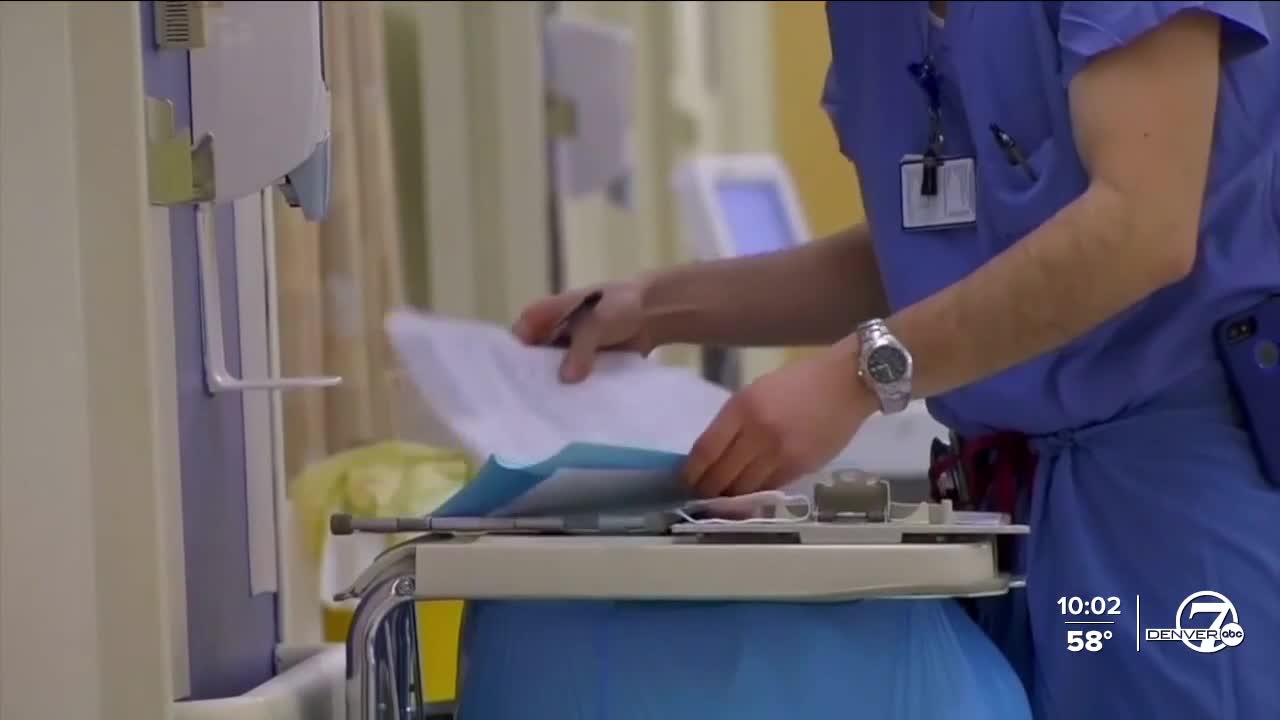DENVER — The nation could wake up Wednesday morning to what's being called the "largest health care strike in history."
Patricia Johnson-Gibson, vice president of the health care division at SEIU Local 105, said negotiations with Kaiser Permanente began in the spring. The union represents around 3,000 workers in Colorado, and approximately 75,000 nationwide.
“Kaiser Permanente is not wanting to come to the table to have good faith bargaining conversations," Johnson-Gibson said. “Kaiser Permanente is not getting it. It's almost like having your oxygen turned all the way down and you're gasping for air. And you're in a space where we're saying, 'help us,' and they're walking away. That's how I feel.”
Johnson-Gibson said a staffing shortage is one of the biggest problems within Kaiser Permanente. She said increased pay would attract more employees to the company and lead to better patient care.
“It's always been about the patients. And we've asked Kaiser, please don't make us do this. We don't want to go out on strike, because in our hearts, we're thinking about patients," said Johnson-Gibson.
Kaiser Permanente said medical offices and urgent cares would remain open during the potential three-day strike, and Johnson-Gibson encourages patients to still seek the care they need.
She said negotiations are expected to last overnight, but local union leaders are anticipating moving forward with the strike starting at 6 a.m. Wednesday.
In a pre-recorded statement, Greg Mills of Kaiser Permanente said, "While plans for a strike are disappointing, Kaiser Permanente will continue to bargain in good faith until we reach a fair and equitable agreement. If there is a strike, our medical offices will remain open. Our urgent cares will remain open. We have doctors, RNs, and other qualified staff ready to take care of our patients and their families."
In a separate statement, Kaiser Permanente Colorado said it aims to "reach a fair and equitable agreement that strengthens Kaiser Permanente as a best place to work and ensures that the high-quality care our members expect from us remains affordable and easy to access."
Kaiser Permanente and leaders and members of the Coalition of Kaiser Permanente Unions bargained yesterday and continue today. We’ve been making progress and hope to reach an agreement. A strike is not inevitable, and it is certainly not justified.
Our goal is to reach a fair and equitable agreement that strengthens Kaiser Permanente as a best place to work and ensures that the high-quality care our members expect from us remains affordable and easy to access.
Health care is still under great stress. Health care employees faced extreme challenges during the pandemic. More than 5 million people left their jobs in health care. As a result, burnout is at record highs, and every health care provider in the nation faces staffing shortages.
But the people of Kaiser Permanente have faced down the pandemic better than most frontline workers because we started from a different place:We have always taken care of our employees so they can care for our members, patients, and communities.
- We lead in total compensation in every market where we operate.
- We offer a great benefits package to our people and our retirees.
- We provided nearly $1 billion in special benefits during the pandemic so our frontline workers had housing, child care and sick benefits to keep them and their families healthy during the pandemic.
We are bringing those important values to the contract discussions with the Coalition unions. We will absolutely do the right thing for our employees, to support them, reward them, and be there for them. We also have a responsibility to make sure our high-quality care is affordable and available to meet our members’ needs.
Will Kaiser Permanente patients be able to get care if a strike occurs?
We take any threat to disrupt care for our members seriously and have plans in place to ensure we can continue to provide high-quality care should a strike occur this week.
Our medical offices and urgent care departments will remain open should a strike occur and will be staffed by our doctors, RNs, trained and experienced managers and staff, and licensed and qualified contract staff.
Our plans ensure that the urgent needs of our members and patients are the top priority. In anticipation of a possible strike, we have worked to move up many appointments, seeing patients sooner. We will proactively contact members affected by any necessary changes in our services during this strike. To meet our members’ needs, we are onboarding contracted professionals to serve in important care roles for the duration of the strike.
Updated information can be found at KP.org.
Where do negotiations stand on wages?
Included in our current offer are guaranteed across-the-board wage increases of 12.5% over 4 years, and a proposed $21 minimum wage in 2024 in Colorado. Minimum wages would increase each year of the 4-year contract.
How long would a strike be?
Three days, beginning Oct. 4.
Health care is still in crisis in this country. Access is stretched thin, and it will take time to recover as an industry and stabilize the whole U.S. system. We can only do that if we work together, management and labor, side by side, for one another, for our patients, and for our communities.

Kaiser Permanente said teams available to keep bargaining with unions




